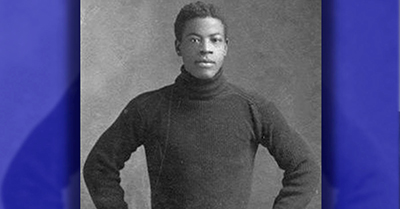On Sept. 16, 1904, Follis signed a contract with the Shelby Blues, becoming the first Black man to play professional football on a racially integrated team. He was also the first Black catcher to transition from college baseball to the Negro leagues.
By Tamara Shiloh
(Source Post News Group):
Charles W. Follis, also known as “The Black Cyclone,” was a trailblazing athlete born on Feb. 3, 1879. He became the first Black professional American football player. Follis played for the Shelby Blues in the “Ohio League” from 1902 to 1906.
On Sept. 16, 1904, Follis signed a contract with the Shelby Blues, becoming the first Black man to play professional football on a racially integrated team. He was also the first Black catcher to transition from college baseball to the Negro leagues.
Follis was born in Cloverdale, Virginia, to James Henry and Catherine Matilda Anderson Follis. He was the third of seven children. His family moved to Wooster, Ohio in 1885.
While attending Wooster College in 1901, Follis chose to play football for the amateur Wooster Athletic Association instead of the college team. It was during this time that he earned his nickname, “The Black Cyclone,” due to his impressive skills on the field.
His exceptional performance in a two-game series against the Shelby Blues in 1901 caught the attention of the Shelby team manager, Frank C. Schiffer. Schiffer recruited Follis to join the team, and he even helped him secure a job at a local hardware store so he could balance work and football.
Follis played for the Shelby Blues during the 1902 and 1903 seasons, achieving notable moments such as a 60-yard touchdown run. In 1904, he helped the Blues reach an 8-1-1 record, with their only loss to the Massillon Tigers, the 1904 Ohio League champions. However, his football career was cut short in 1906 due to injuries.
Apart from football, Follis also excelled in baseball, becoming the first Black catcher to transition from college baseball to the Negro leagues. He was known for his powerful hitting and impressive performance against former major league stars.
Tragically, Follis developed pneumonia after a game and passed away in Cleveland on April 5, 1910, at the age of 31. He is buried in Wooster Cemetery.
Interestingly, Follis’s historical significance as the first Black professional football player was not widely known until researchers rediscovered his achievements in old newspapers in 1975. His teammate, Branch Rickey, who later became a prominent figure in baseball, might have been influenced by Follis when he signed Jackie Robinson, breaking baseball’s color barrier in 1947.
Follis’s legacy is commemorated in various ways, including the dedication of Follis Field at Wooster High School and the naming of a street in Shelby, Ohio, in his honor. A play called “The Black Cyclone” also celebrates his life and athletic career. Although he was inducted into the College of Wooster Hall of Fame in 2013, he has not yet received recognition from the Pro Football Hall of Fame.

